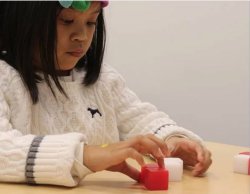Grants Awarded for Down Syndrome Research
Montclair State psychology lab studies spatial abilities to help support job and living skills
Posted in: Homepage News and Events, Psychology

In the Spatial Development Lab at Montclair State, Assistant Psychology Professor Jennifer Yang compares spatial abilities – skills like tying shoes, using hand tools and giving and receiving directions – of typically developing children to young adults with intellectual and learning disabilities. It is crucial research to prepare young adults with Down syndrome for success in their daily lives.
Yang’s research team is exploring ways to strengthen their spatial abilities, paving a way for identifying jobs that play to their strengths and training to improve areas of weakness. The lab is one of the University’s clinical labs in psychology that have received grant funding this year for research.
The National Institutes of Health is providing more than $500,000 to help Yang advance the academic research on spatial abilities and Down syndrome, an area that has been severely understudied.
About 6,000 babies with Down syndrome are born in the United States each year, Yang says. While it is not the most common cause of intellectual disabilities, Down syndrome is the most common genetic cause of intellectual disabilities.
Previous research has considered spatial abilities an area of strength in people with the chromosomal disorder. But Yang suggests it is premature to conclude that spatial abilities, in general, are an area of strength for people with Down syndrome.
“As an integral part of human cognition, spatial abilities are the foundation for many complex skills that appear to present unique problems for persons with Down syndrome,” Yang says.
This includes navigation, understanding and using hand tools, estimating distance and measurement, and a wide range of reasoning and communication skills, such as solving mathematics problems and using spatial metaphors.

The first grant of $445,000 is for “A Profile of Spatial Abilities in People with Down Syndrome and Their Correlations with Everyday Behavior.” The project will examine how laboratory behavioral tasks correlate with everyday spatial behaviors. The study will compare typically developing children ages 4 to 9 with people with intellectual disabilities ages 12 to 25.
Lauren Grove, a PhD student in the Clinical Psychology program and the lab’s graduate research assistant, says the tasks test spatial awareness – for example, what someone else in a different part of the room might see – and spatial ability, and how the study participants manipulate and interact with their environment.
The research is expected to pave the way for clinical trials designed to improve the spatial abilities of people with Down syndrome, skills that are critical to living independently and job prospects, Yang says.
The second research grant of $135,000 is a collaboration with Professor Edward C. Merrill, director of Graduate Studies at the University of Alabama, titled “Assessing the Malleability of Spatial Abilities in Individuals with Down Syndrome.”
The researchers have concluded that people with Down syndrome exhibit difficulties with mental rotation and perspective taking, and performing complex spatial tasks such as wayfinding and environmental learning.
These are the skills used in a variety of specialty jobs, such as grocery stocking, packaging and assembling, which are among the most commonly reported jobs for adults with Down syndrome, Yang says.
The primary goal of the research is to evaluate the malleability of mental rotation and perspective taking in people with Down syndrome by providing experiences with numerous spatial activities, including putting together puzzles, building with blocks and computer search tasks.
Data will be used to investigate whether spatial abilities of persons with Down syndrome can be modified by experience with spatial activities, reducing the performance differences between typically developing children and young adults with Down syndrome.
“Taking all these factors into account, it is increasingly crucial to research spatial abilities in people with Down syndrome considering their impact on everyday function, general cognitive processes, independent living, job prospects, aging and neuroscience research,” Yang says.
Story by Staff Writer Marilyn Joyce Lehren.
